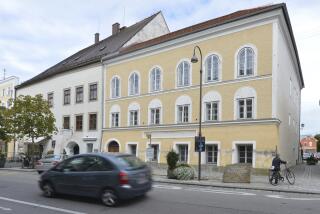Bye-Bye, Bonn
- Share via
Novelist John Le Carre called Bonn “A Little Town in Germany,” a bland place peopled by gray-faced bureaucrats who scurried about their work of running the postwar government. Bonn never seemed a center of power like Washington, Moscow, London or Paris. But for 40 years Berlin, the historic Prussian capital, lay isolated deep within East Germany, the city itself divided between East and West. The West poured money into its half of Berlin to make a glittery symbol of freedom and capitalism that stood in contrast to gloomy, rubble-strewn East Berlin, the capital of the repressive Communist state.
All that has changed since reunification of the two Germanys in 1990, and the Federal Republic of Germany has begun the massive effort of moving the seat of government from quiet Bonn (population 300,000) to buzzing Berlin (3.5 million). The restored capital is being transformed into the European city of the future, intent on leaving behind the old scars and traumas of the Kaiser’s Reich and the Nazi era. The German president’s office has already been transferred to Berlin. The chancellor’s office is moving now. The parliament will reconvene in the renovated Reichstag building in September.
More than 14,000 civil servants and politicians have begun the exodus from Bonn, the historic university city on the Rhine, a move that will be completed sometime next year. The Bundestag, the lower house of parliament, paid tribute to Bonn during its final sitting there July 1. Former Chancellor Helmut Kohl said, “Bonn has been the symbol of conspicuous modesty for Germany.” Bonn was head-down, hard-work--in contrast to the bravado and militarism of the past. Imagine, for comparison, moving the capital of California from Sacramento to Los Angeles.
The Bonn-Berlin transfer has been controversial ever since reunification, but it also seemed inevitable. The cost is estimated at $11 billion, including $2 billion in compensation to Bonn. Many jobs, and the defense ministry, will remain in Bonn. Except perhaps for its ego, the city on the Rhine is not suffering. The population is growing and the city is developing a stronger base of business and industry, including computers and telecommunications. “The lights are not going out in Bonn,” said Mayor Baerbel Dieckmann.
The transfer bears psychological and symbolic overtones. Bonn was in the far west of Germany, close to the border with Belgium. Berlin is 400 miles to the east, the economic fulcrum between Western Europe and new democracies of Central and Eastern Europe. And there is a new generation of leadership, exemplified by Chancellor Gerhard Schroeder, that grew up in the postwar era and is less burdened with guilt over the sins of the past.
Kohl urged his colleagues to retain their modesty even as they move to boisterous Berlin. “Let us resist the temptation to show off our increased influence in a self-important way,” Kohl said. Whether that is possible is the next chapter in German history.
More to Read
Sign up for Essential California
The most important California stories and recommendations in your inbox every morning.
You may occasionally receive promotional content from the Los Angeles Times.













